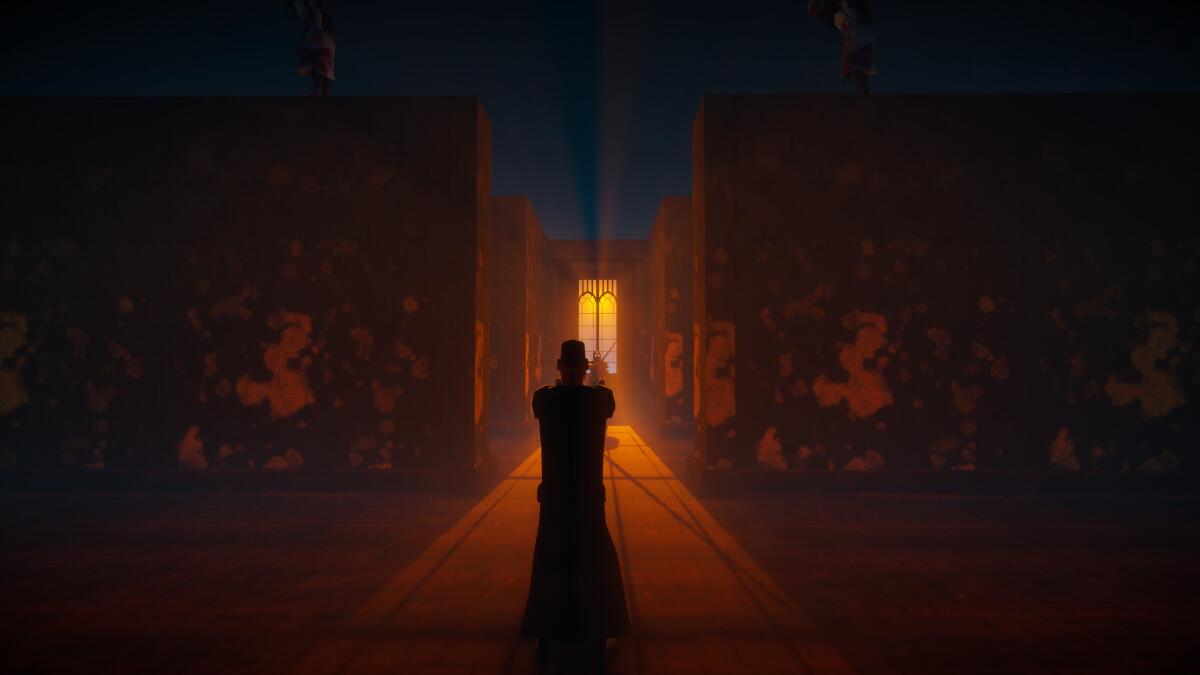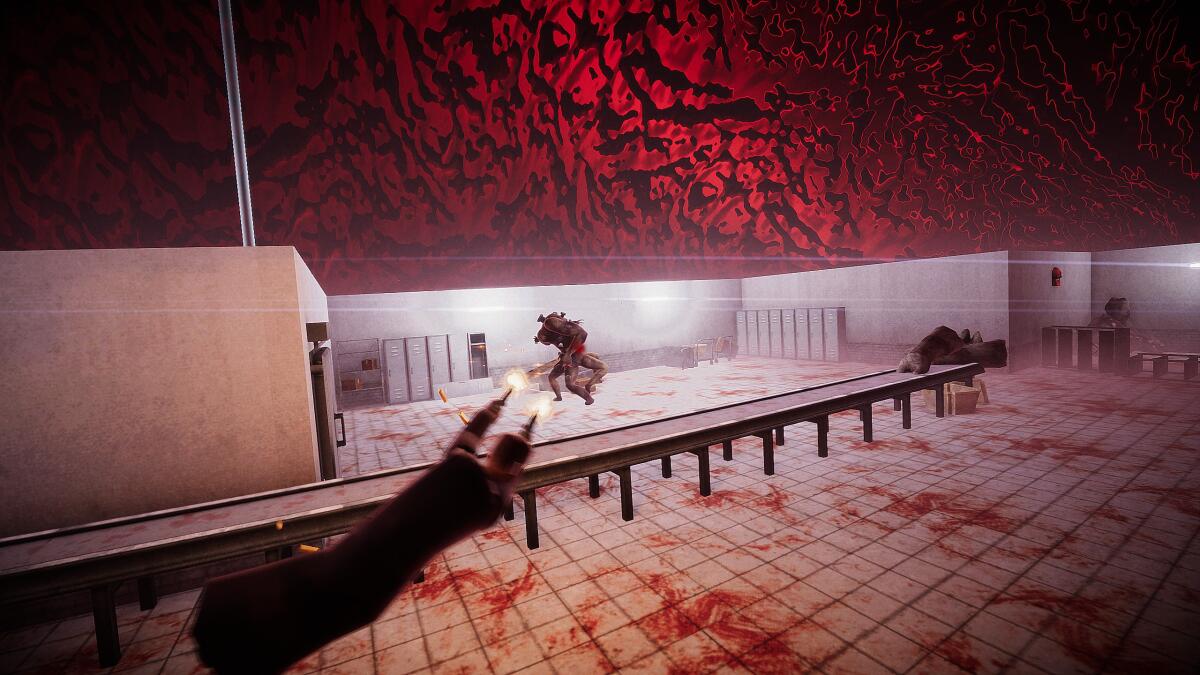Vampires, addiction, a broken heart and the metaphorical mayhem of ‘El Paso, Elsewhere’

Love, “El Paso, Elsewhere” tells us at the start, is a one-way trip. Should it end — and let’s be clear, it usually does — there’s no returning to the person we were pre-heartbreak. And sometimes the days, weeks and months post-heartbreak are when the true carnage begins.
“El Paso, Elsewhere” is part third-person shooter and part metaphorical meditation on the trauma of heartache. Set inside a Texas motel, the tone of the game is hot, sweaty, boxed-in, claustrophobic and chaotic. It reeks, in other words, of desperation. Informed by classic, comic-style video game “Max Payne” as much as it is the early work of Quentin Tarantino, “El Paso, Elsewhere” wants to challenge us in multiple ways. One of them is to throw demonic “Doom”- and “Quake”-style monsters our way while we juggle bullets and stakes and high-flying dives.
It also wants us to stop and think about terrors closer to home. Our player-controlled protagonist struggles with recovery from multiple addictions and afflictions — pills, romance and what it means to survive an abusive relationship where the violence toward our hero was emotional rather than physical, at least until our ex conjures an army of vampires. Saving the world is a goal, but so is coming to terms with our inner demons. “El Paso, Elsewhere” is a fantastical, hellish game in which the walls and ceilings of a suffocating motel disappear before us and crippling horrors are unrelenting in their pursuit. It’s a battle of persistence, and of attempting to move on from a romance that felt world-altering.
“This game’s development started 3 ½ years ago, and I have segments of the script from that version. They’re bad. They’re much more pulpy,” says Xalavier Nelson Jr., the 25-year-old creator of the project that began as a love letter to “Max Payne.” “They’re grounded in that affected parody of ‘Max Payne,’ which itself was a parody of the noir genre. One of the things that occurred as development continued was that all of the irony of the project — all of the tongue-in-cheek winking at our predecessors and the conventions and expectations players would bring into the project — we stripped that away one by one. No, we aren’t going to take the dodge of irony.”
In turn, “El Paso, Elsewhere,” which was released Tuesday for PCs and Xbox consoles, is a game that feels decidedly personal, so much so that I ask Nelson if it’s autobiographical. Not fully, but somewhat, he says. He notes he’s not the game’s protagonist, this despite voicing him and rapping the game’s inner-turmoil hip-hop soundtrack, but the emotions the game conjures are indeed pulled from real-life dramas. The result is a genre mash-up that transcends its influences, an action-first game that attempts to grapple with our vices and where we place our devotion. There’s plenty of grotesque frights to battle, but Nelson’s in-game monologues as recovering addict James Savage, as well as its love-gone-wrong setup, give “El Paso, Elsewhere” a veil of intimacy.

“We are going to be real and personal and vulnerable and hurting,” Nelson says of the game’s mission statement. “This is a person who is never intact. This is a person who is going through and has gone through abuse and recovery cycles, both for substances and a relationship. It feels metaphorical and personal because we realized early on we could create something ironic that would be received well as a new spiritual successor to a game that people loved, or we could go the harder, more vulnerable, more commercially fraught route of making something new and real that was open to being criticized and exposed.”
It also meant Nelson would reveal more of himself. The El Paso-based artist founded Strange Scaffold in 2019; it previously released the charmingly lo-fi puzzle comedy “An Airport for Aliens Currently Run by Dogs,” and Nelson has built a résumé as a games writer, having contributed to titles such as “Reigns: Beyond” and “Hypnospace Outlaw,” among others. Recently, Nelson designed a game called “Dreamfather” for the Real Unreal, the Grapevine, Texas-based outpost of experiential art firm Meow Wolf.
None were as personal as “El Paso, Elsewhere.”
Nelson partly credits his mother for taking “El Paso, Elsewhere” down a more serious path; he says she has a belief, which she has instilled in him and he sometimes tries to fight against, that many of the best stories have a love component. So his initial vision for the project — of the character who became James Savage standing on a Texas road with a vampire in his trunk — would gradually become one with confessional notes, nodding to everything from Nelson’s relationship history to his faith.
“What if his ex was the Lord of the Vampires?” Nelson says of Savage. The elaborate backdrop helps sell the shooter fantasy, but also the idea that a man was the one who was the victim of abuse, something rarely seen in pop art and a detail Nelson worried players could be skeptical of.
“What happens when you get [messed up] by love and have to confront it all over again, with all the lingering weirdness that comes from being in a traumatic relationship?” Nelson continues. “I can personally say I’ve been in at least one traumatic, weird relationship. That love doesn’t go away. You still have these feelings about a person or a memory that hits when you smile and you go, ‘Wait, that person changed me. I’m recovering still from knowing that person.’ It lingers. There’s a reality there that’s complex and distressing and utterly human, and I realized this is where our story needed to rest.”
So he got to work. “I put together in a day a design document for a project that features our main character, James Savage, having been in a relationship with the Lord of the Vampires coming back to stop the monster he loves before she ends the world.”
Third-person shooters aren’t my go-to genre, but I’ve stuck with “El Paso, Elsewhere” because even amid its surreal landscapes — boxy, darkly shaded motel corridors where lamps sometimes take flight — the game feels relatable. When in the throes of heartache, many of us can be prone to end-of-the-world proclamations, and though I’ve never been pummeled by mummified corpses when in deep pain, I get the easy analogy of confronting demons, both our own and those a former lover have left us with (Savage in the game is a Black folklore researcher, and Nelson assures me that the creatures in the game are pulled from historical and religious texts).

“El Paso, Elsewhere” also nails the all-consuming nature of heartbreak. The world can be closing in on itself — in the case of the game, literally — but a broken heart has a way of derailing all other tasks and obligations. The game’s cutting dialogue makes it clear that Savage is not quickly moving on despite the fate of the world being in his hands.
There are other heartbreak touchstones. Pills, for instance, revive the video game health bar of the former and once-again addict, which serves as not only a nod to “Max Payne” but a statement about the dangers of self-medicating. By making the character one who struggles with addiction, every trip off the wagon keeps Savage alive at the expense of slowly killing himself.
Nelson summarizes his intention: “You’re playing through a retro shooter and you’ve just pulled off a slow-motion dive and a fantastic shot and blown a biblically accurate angel out of the sky, and then your character whispers to himself, ‘I don’t think she’s thinking about me anymore.’ You just go, ‘What?!’”
All of it leads me to wonder if making the game has been healing for the independent developer.
“I haven’t so much found it healing as sobering,” Nelson says. “I have the responsibility of having told this story to take the lessons from it seriously. There is a sentence in one of the endings of the project, which is, ‘It is terrifying to think of dying with all of these scars — let alone living with them. Trying with them. Trying to be good.’ ... Growing up in the church, and I’m still a Christian, but one thing that’s very tempting is to think of a younger version of myself as more pure, more capable of being good and having a good life. I can’t hold this perspective. I can’t hold this version of myself as a paragon. I have to live with these scars and see them as beautiful and keep trying.”
Rather than ask the player if they want to continue or restart from an earlier save or checkpoint, each setback — death, essentially — in “El Paso, Elsewhere” is met with the text “You keep going.” It’s all any of us can do when haunted by the memory of an ex, even if they’re not the ruler of the vampires.
'El Paso, Elsewhere'
More to Read
The biggest entertainment stories
Get our big stories about Hollywood, film, television, music, arts, culture and more right in your inbox as soon as they publish.
You may occasionally receive promotional content from the Los Angeles Times.











